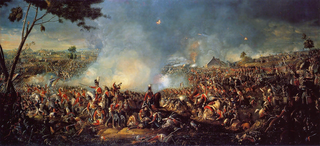
The Battle of Waterloo was fought on Sunday 18 June 1815, near Waterloo, marking the end of the Napoleonic Wars. The French Imperial Army under the command of Napoleon I was defeated by two armies of the Seventh Coalition. One of these was a British-led force with units from the United Kingdom, the Netherlands, Hanover, Brunswick, and Nassau, under the command of field marshal Arthur Wellesley, Duke of Wellington. The other comprised three corps of the Prussian army under Field Marshal Blücher; a fourth corps of this army fought at the Battle of Wavre on the same day. The battle was known contemporarily as the Battle of Mont Saint-Jean in France and La Belle Alliance in Prussia.

The Battle of Ligny, in which French troops of the Armée du Nord under the command of Napoleon I defeated part of a Prussian army under Field Marshal Blücher, was fought on 16 June 1815 near Ligny in what is now Belgium. The result was a tactical victory for the French, but the bulk of the Prussian army survived the battle in good order, was reinforced by Prussian troops who had not fought at Ligny, and played a role two days later at the Battle of Waterloo. Ligny was the last victory in Napoleon's military career.
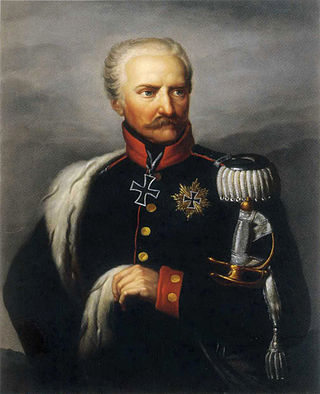
Gebhard Leberecht von Blücher, Graf (count), later elevated to Fürst (prince) von Wahlstatt, was a Prussian Generalfeldmarschall. He earned his greatest recognition after leading his army against Napoleon I at the Battle of Leipzig in 1813 and the Battle of Waterloo in 1815.

Bernard Cornwell is a British-American author of historical novels and a history of the Waterloo Campaign. He is best known for his long-running series of novels about Napoleonic Wars rifleman Richard Sharpe. He has also written The Saxon Stories, a series of thirteen novels about the unification of England.
Sharpe is a series of historical fiction stories by Bernard Cornwell centred on the character of English soldier Richard Sharpe. The stories formed the basis for an ITV television series featuring Sean Bean in the title role.
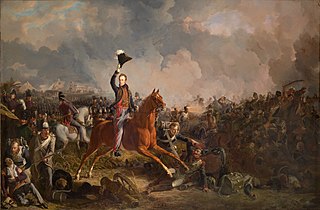
The Battle of Quatre Bras was fought on 16 June 1815, as a preliminary engagement to the decisive Battle of Waterloo that occurred two days later. The battle took place near the strategic crossroads of Quatre Bras and was contested between elements of the Duke of Wellington's Anglo-allied army and the left wing of Napoleon Bonaparte's French Armée du Nord under Marshal Michel Ney. The battle was a tactical victory for Wellington, but because Ney prevented him going to the aid of Blucher's Prussians who were fighting a larger French army under the command of Napoleon Bonaparte at Ligny it was a strategic victory for the French.

The Waterloo campaign was fought between the French Army of the North and two Seventh Coalition armies, an Anglo-allied army and a Prussian army. Initially the French army had been commanded by Napoleon Bonaparte, but he left for Paris after the French defeat at the Battle of Waterloo. Command then rested on Marshals Soult and Grouchy, who were in turn replaced by Marshal Davout, who took command at the request of the French Provisional Government. The Anglo-allied army was commanded by the Duke of Wellington and the Prussian army by Field Marshall Graf von Blücher.

Sharpe's Trafalgar is the fourth historical novel in the Richard Sharpe series by Bernard Cornwell, first published in 2000. It is the first of the novels in the wars against Napoleon, putting the army ensign at the Battle of Trafalgar in 1805.
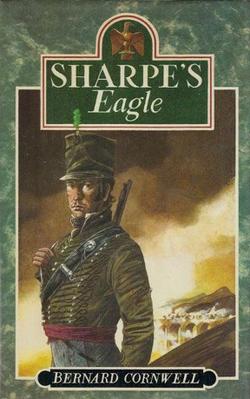
Sharpe's Eagle is a historical novel in the Richard Sharpe series by Bernard Cornwell, first published in 1981. The story is set in July 1809, in the midst of the Talavera Campaign during the Peninsular War. It was the first Sharpe novel published, but eighth in the series' chronological order.
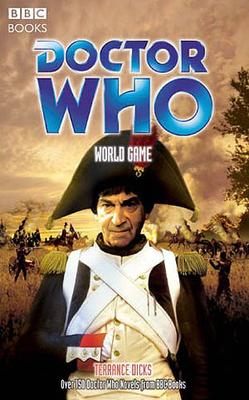
World Game is a BBC Books original novel written by Terrance Dicks and based on the long-running British science fiction television series Doctor Who. It features the Second Doctor and the Lady Serena and is set during "Season 6B". It is also a partial sequel to another Dicks' Past Doctor Adventure, Players and documents the return of the Countess.
Grand Battery was a French artillery tactic of the Napoleonic Wars. It involved massing all available batteries into a single large, temporary one, and concentrating the firepower of their guns at a single point in the enemy's lines.
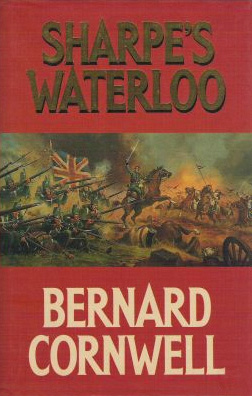
Sharpe's Waterloo is a historical novel in the Richard Sharpe series by Bernard Cornwell. Originally published in 1990 under the title Waterloo, it is the eleventh novel of the Sharpe series and the twentieth novel in chronological order. Cornwell stated that he intended to end the series here, but later changed his mind.
Sharpe's Waterloo is a British television drama, the 14th part of a series that follows the career of Richard Sharpe, a fictional British soldier during the Napoleonic Wars. The adaptation is based on the 1990 novel of the same name by Bernard Cornwell.

The Battle of Issy was fought on the 2 and 3 July 1815 in and around the village of Issy, a short distance south west of Paris. The result was a victory for Prussian General von Zieten over a French army commanded by General Dominique Vandamme.
James Graham was an Irish non-commissioned officer (NCO) in the British Army during the Napoleonic Wars, recognised as the "bravest man in the army" by the Duke of Wellington. Serving in the Coldstream Guards, he was commended for his gallantry during the defence of Hougoumont, at Waterloo. Graham saved the life of an officer, and his own brother, and was among the small group responsible for closing the North Gate at Hougoumont after a French attack – an act which won the Duke of Wellington's encomium. He was rewarded with a specially cast gallantry medal and an annuity. After later serving in the 12th Royal Lancers, Graham was discharged in 1830 for ill health, and died at the Royal Hospital Kilmainham in 1845.
Bernard Cornwell's career started in 1981 with Sharpe's Eagle. He has been a prolific historical novelist since then, having published more than 60 novels.

Arthur Wellesley, 1st Duke of Wellington, was an Anglo-Irish soldier and Tory statesman who was one of the leading military and political figures of 19th-century Britain, commanding the British Army during the Napoleonic Wars and serving twice as prime minister. He has frequently been depicted in various cultural media.

Sharpe's Assassin is the twenty-first historical novel in the Richard Sharpe series by Bernard Cornwell, published in 2021. The story is set in June 1815, immediately after the Battle of Waterloo, and during the occupation of Paris.













